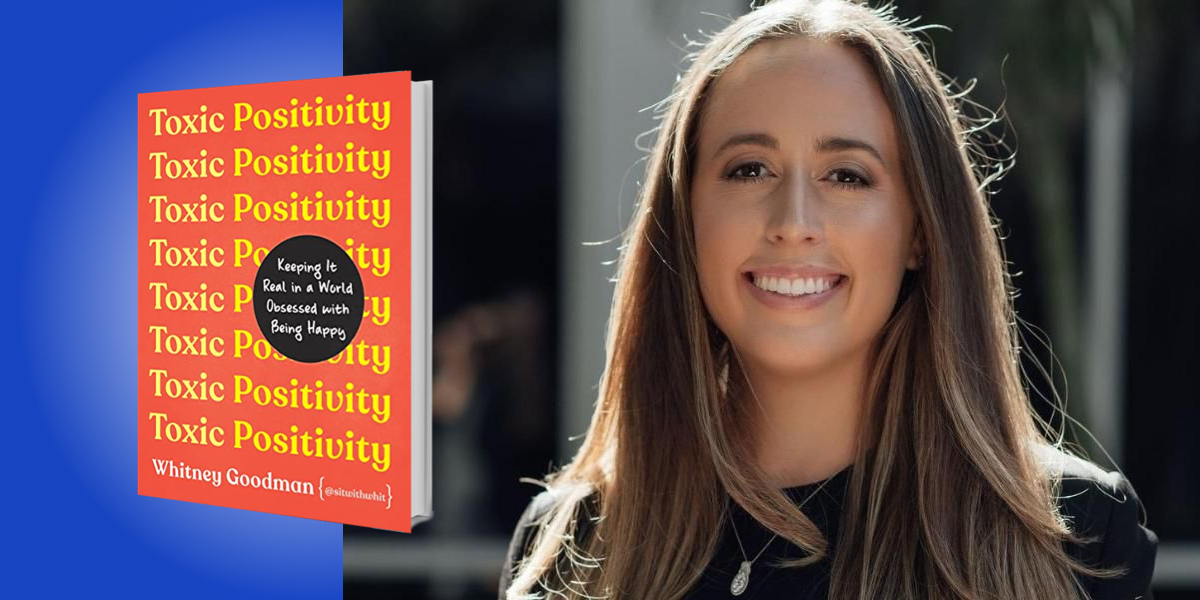Whitney Goodman is the radically honest psychotherapist behind the popular Instagram account @sitwithwhit and owner of the Collaborative Counseling Center, a private therapy practice in Miami. She helps individuals and couples heal past wounds and create the life they’ve always wanted. Her work has been featured in dozens of publications and programs, including the New York Times, Teen Vogue, New York Magazine, InStyle, and Good Morning America.
Below, Whitney shares 5 key insights from her new book, Toxic Positivity: Keeping It Real in a World Obsessed with Being Happy. Listen to the audio version—read by Whitney herself—in the Next Big Idea App.
1. Positivity can hurt.
I want you to imagine that you just lost someone very important to you. You’re grieving, crying, and having a lot of trouble getting through the day. Some days you’re really not sure you’ll make it without them. You decide to call a friend for support, even though it was so difficult for you to pick up the phone and make the call. They answer the phone, and you immediately start crying. You’re not sure what you want them to say or do, but you know you need support. Your friend, with the best of intentions, starts with, “They really wouldn’t want to see you sad. Be grateful for all the support you have around you! They would want to see you living life and enjoying it.” You start to shrink into yourself. You know there isn’t any more room for your emotions here. It’s time to “be strong” and “be happy.” So, you muster up all the strength you have to say, “Yeah, thanks” and get off the phone.
Situations like this happen every day. In the deepest moments of struggle, we place an unrelenting pressure on people to be happy, strong, and moving on no matter what the circumstances. This is toxic positivity.
Positivity itself isn’t toxic. It becomes toxic when used at the wrong time and with the wrong topics. Toxic positivity denies an emotion. When we use toxic positivity, we are telling ourselves and others that a certain emotion shouldn’t exist, and that if we try harder, we can eliminate it entirely. Unfortunately, this doesn’t make anyone happier. All it does is force us to suppress our emotions, and it drives a wedge between us and the people we care about.
2. Complaining effectively.
Humans love to complain. “Having a place to vent” is actually one of the most common reasons people ask to work with me. Despite its popularity, complaining has a terrible reputation. Articles and gurus insist that too much complaining “lowers your vibration” and stops you from achieving your dreams, having friends, and living the life you want.
“In the deepest moments of struggle, we place an unrelenting pressure on people to be happy, strong, and moving on no matter what the circumstances. This is toxic positivity.”
But complaining can actually be quite helpful—it’s one of the main ways that we bond with others. It’s an effective way to share how you feel, connect, and evoke empathy in the listener. Complaints are how we let people know what we need and how to meet our needs. It also gives us a peek at what is important, and what might be bothering us a little too much.
To eliminate complaining is not the answer—what matters is improving how you complain. Complaining is most effective when the complainer:
- uses facts and logic,
- knows their ideal outcome, and
- understands who has the ability to make it happen.
Identify these three things, and complaining is more likely to feel useful and effective, and lead to better outcomes. Here are eight tips for effective complaining:
- Figure out the complaint—what is really bothering me?
- Identify the goal.
- Are you trying to make someone aware of an issue?
- Do you want to enact change?
- Do you want to be heard?
- Do you want to be validated?
- Do you want advice?
- Choose the right audience—who can help me? Is there anyone who would understand or relate? Don’t always complain to the same people. Pick people who can actually validate you or help with your goal.
- Decide if it’s worth it. Think about the issues that are really important, and complain in moderation.
- What will happen if I complain about this?
- What will happen if I don’t complain about this?
- Validate that you may want to complain because you’re looking for connection. Is there anything else you can share to connect through something other than a complaint?
- Write it down. Research shows that writing helps organize experiences and leads to greater understanding of what happened and how to cope.
- Be as direct as possible.
- Remember that there are real inequities in the world. There are people who have it worse.
The goal is not to eliminate complaining, because when we complain effectively, we can achieve the closeness, support, and change that we all crave.
“The goal is not to eliminate complaining, because when we complain effectively, we can achieve the closeness, support, and change that we all crave.”
3. Listen, understand, validate, and empathize.
Every week I host a Q&A on Instagram. Most of the questions sound something like, “What do I say when someone is dealing with X?” or, “How can I help someone dealing with Y?”
Toxic positivity might make you feel like there are things you can and can’t say, but you can say whatever you want in your relationships. Supporting ourselves and others isn’t really about saying the “right” or “perfect” thing. How the words come out will depend on who you’re talking to, the topic, and the environment. When you don’t know what to say to someone who is struggling, strive to include these four ingredients in your communication: curiosity, understanding, validation, and empathy.
Curiosity means always learning about the people around us, and also about ourselves. We’re learning about what makes us feel safe, how we like to be helped, and what we need in moments of crisis. What we need and want will evolve throughout our lives. Curiosity is asking questions, being open to change, and knowing that we will never be done getting to know ourselves and others. Curiosity opens the door to understanding, validation, and empathy.
Understanding happens after we’ve used curiosity. Understanding isn’t the same thing as agreeing. I can understand why you might feel a certain way without experiencing that feeling myself or agreeing with it. Understanding is using your curiosity to paint a picture that investigates the why, the how, and the what. Understanding makes room for possibility.
Once we understand something, we can validate it. Validation is not the same as endorsement. It simply means that you can see how something is possible and recognize it in yourself or someone else. This might be challenging at first, but it is absolutely possible.
Empathy arrives last. Empathy is about making space for the feelings, understanding them, and allowing the feelings to exist. Everything makes sense in context. When we learn why a person is the way they are, we’re able to develop empathy.
If you lead with curiosity and seek understanding, the validation and empathy will flow naturally—and, more than likely, so will the words you were searching for.
4. Intent matters. Impact matters more.
Most people genuinely want to be helpful, but sometimes we mess up—royally. Our intentions are completely misunderstood, or the other person doesn’t want to receive our help. This may happen because the way we helped was abrasive, we weren’t listening to what the other person needed, or the other person simply wasn’t willing to accept our help, even if it was offered in a gracious and kind way.
“If we want to be better support people, we have to acknowledge that our intent matters, but our impact matters more. You can hurt someone even if you’re trying to be nice.”
Your intent matters, but your impact matters more. Knowing what to say and when to say it has become really challenging. There are so many rules, and it seems like they’re always changing. On social media, you’ll find a litany of posts that declare what is the “right” thing to say and what is “wrong.” This book might even add to the feeling that you just can’t seem to get it right.
I want you to know that there’s no perfect thing to say. Everyone has their own preferences and sensitivities. Intention versus impact are not equal forces that can be completely separated. Intention does matter, and research supports this. In a recent study, participants were administered equal electric shocks. Those who thought the shocks were administered intentionally experienced them as much more painful than those who thought the shocks were administered by accident. People are also highly motivated to assign blame or punish someone when the harmful act is viewed as intentional. Harsher punishments are given for acts that cause more suffering, and intentionality is taken into account. Studies also show that we are more likely to forgive a crime when the reasoning behind it seems just.
If we want to be better support people, we have to acknowledge that our intent matters, but our impact matters more. You can hurt someone even if you’re trying to be nice.
5. Stop trying to be happy.
Opt out of the constant quest to find happiness. I know, it sounds counterintuitive, but research shows that the more people see happiness as a goal, the less happy they are. Americans invest more time, energy, and money into finding happiness than citizens of any other country—yet we aren’t getting any happier. According to the General Social Survey, there has been almost no change in American happiness levels since 1972.
Instead of pursuing happiness, I want you to pursue fulfillment through a value-driven life. A value-driven life makes room for the fact that living in accordance with our values doesn’t always mean feeling happy, but it is in alignment with who we are and what we want.
The first step is discovering your values. These may change throughout your life, so what you commit to today can always change. Values are not meant to serve as rules or directives, but as guideposts that help you make decisions and feel fulfilled.
Start by thinking about your values in each of these four domains: work/education, relationships, personal growth/health, and leisure. In each of these areas, ask yourself:
- What’s important?
- What do I care about?
- What would I like to work toward?
- What values were instilled in me by my culture and family? Are those values important to me as an individual today?
To listen to the audio version read by author Whitney Goodman, download the Next Big Idea App today:
































